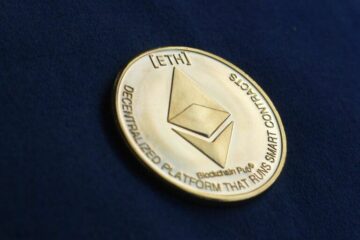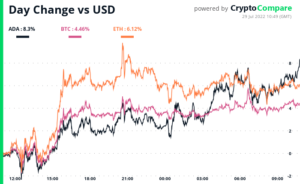
After an initial surge at the beginning of the year, most digital assets have lost momentum, with Bitcoin ($BTC) being down 3.5% over the past month and over 62% year-to-date. Similarly, altcoins such as $XRP are up in the year but down significantly over the last few weeks.
As the U.S. faces a “debt death spiral” of $33 trillion, analysts from Jefferies have now cautioned that the Federal Reserve may have to resume its money printing—possibly causing the U.S. dollar to crash and boosting the price of the flagship cryptocurrency as it competes with gold.
In a recent note to clients Christopher Wood, global head of equity strategy at Jeffries, called Bitcoin and gold “critical hedges” against the return of inflation as G7 central banks “will not be able to exit from unconventional monetary policy in a benign manner and will ultimately remain committed to ongoing central bank balance-sheet expansion in one form or another.”
Wood’s comments come at a time in which the U.S. Federal Reserve and other major central banks throughout the world have been aggressively raising interest rates to rein in inflation. The aggressive rate hikes have led to the collapse of several institutions, including Credit Suisse, which was bought by UBS for about $3.3 billion earlier this year.
After boosting its balance sheet with massive growth during the COVID-19 crisis and the lockdowns mandated over it, the Fed started to reduce its bloated balance sheet of almost $9 trillion in the spring of 2022. The process of quantitative tightening involves the central bank withdrawing money from the financial system, and shifting the responsibility of new debt to the private sector.
<!–
–> <!–
–>
Now, analysts at Deutsche Bank have warned that the world could see a repeat of the 1970s stagflation era. In a note reported on by MarketWatch, macro strategist Henry Allen and research analyst Cassidy Ainsworth-Grace wrote:
So given inflation is still above its pre-pandemic levels, it is important not to get complacent about its path. After all, if there is another shock and inflation remains above target into a third or even a fourth year, it is increasingly difficult to imagine that long-term expectations will repeatedly stay lower than actual inflation.
Potential factors influencing such a shock could be the recent oubreak of war in Gaza, after the Palestinian militant group Hamas launched a multi-pronged attack on Israel – which led to its crypto accounts being frozen – and increased worker strikes, along with potential weather patterns affecting commodity prices.
If the US faces a recession, the Federal Reserve may be forced to flip on its hawkish stance and start stimulating the economy once again with lower interest rates following the recent money supply expansion. Such a move, Wood wrote, is “likely to culminate in the collapse of the U.S.-dollar paper standard to the benefit of both gold bullion owners and also owners of bitcoin.”
Bitcoin and other major cryptocurrencies like Ether (ETH) and XRP have been attracting institutional interest over the last few weeks. As CryptoGlobe reported, major financial powerhouses that collectively manage an astounding $27 trillion in assets are making inroads into the world of Bitcoin and cryptocurrency after a race to list the first spot Bitcoin exchange-traded fund (ETF) in the United States kicked off.
In his note, Wood argued that Bitcoin has now “become investible for institutions” as custodian arrangements have made it an alternative store of value to gold.
Featured image via Unsplash.
- SEO Powered Content & PR Distribution. Get Amplified Today.
- PlatoData.Network Vertical Generative Ai. Empower Yourself. Access Here.
- PlatoAiStream. Web3 Intelligence. Knowledge Amplified. Access Here.
- PlatoESG. Carbon, CleanTech, Energy, Environment, Solar, Waste Management. Access Here.
- PlatoHealth. Biotech and Clinical Trials Intelligence. Access Here.
- Source: https://www.cryptoglobe.com/latest/2023/10/debt-spiral-could-trigger-dollar-crash-and-boost-bitcoin-ether-and-xrp-prices-as-institutions-eye-critical-hedges/
- :has
- :is
- :not
- $3
- $UP
- 11
- 2022
- a
- Able
- About
- above
- Accounts
- actual
- Ads
- affecting
- After
- again
- against
- aggressive
- aggressively
- All
- allen
- almost
- along
- also
- Altcoins
- alternative
- an
- analyst
- Analysts
- and
- Another
- ARE
- argued
- arrangements
- AS
- Assets
- astounding
- At
- attack
- attracting
- Balance
- Balance Sheet
- Bank
- Banks
- BE
- been
- Beginning
- being
- benefit
- Billion
- Bitcoin
- boost
- boosting
- both
- bought
- bullion
- but
- by
- called
- causing
- central
- Central Bank
- Central Banks
- Christopher
- clients
- CNBC
- Collapse
- collectively
- come
- comments
- committed
- commodity
- commodity prices
- competes
- could
- COVID-19
- COVID-19 Crisis
- Crash
- credit
- crisis
- cryptocurrencies
- cryptocurrency
- CryptoGlobe
- custodian
- Death
- Debt
- Deutsche Bank
- difficult
- digital
- Digital Assets
- Dollar
- down
- during
- Earlier
- economy
- equity
- Era
- ETF
- ETH
- Ether
- Ether (ETH)
- Even
- exchange-traded
- exchange-traded fund (ETF)
- Exit
- expansion
- expectations
- eye
- faces
- factors
- Fed
- Federal
- federal reserve
- few
- financial
- financial system
- First
- flagship
- Flip
- following
- For
- forced
- form
- Fourth
- from
- fund
- G7
- get
- given
- Global
- Gold
- gold bullion
- Group
- Growth
- Have
- Hawkish
- head
- henry
- Hikes
- his
- HTML
- HTTPS
- if
- image
- imagine
- important
- in
- increased
- increasingly
- inflation
- influencing
- initial
- Institutional
- Institutional Interest
- institutions
- interest
- Interest Rates
- into
- Investopedia
- involves
- Israel
- IT
- ITS
- jpg
- Last
- launched
- Led
- levels
- like
- List
- lockdowns
- long-term
- lost
- lower
- Macro
- made
- major
- Making
- manage
- manner
- MARKETWATCH
- massive
- May..
- Momentum
- Monetary
- Monetary Policy
- money
- money supply
- Month
- most
- move
- New
- note
- now
- of
- off
- on
- once
- ONE
- ongoing
- or
- Other
- over
- owners
- Paper
- past
- path
- patterns
- plato
- Plato Data Intelligence
- PlatoData
- policy
- potential
- powerhouses
- price
- Prices
- private
- private sector
- process
- Race
- raising
- Rate
- rate hikes
- Rates
- recent
- recession
- reduce
- remain
- remains
- repeat
- REPEATEDLY
- Reported
- research
- Reserve
- responsibility
- resume
- return
- s
- Screen
- screens
- sector
- see
- several
- sheet
- SHIFTING
- significantly
- Similarly
- sizes
- Spot
- spring
- stagflation
- stance
- standard
- start
- started
- States
- stay
- Still
- store
- store of value
- Strategist
- Strategy
- Strikes
- such
- supply
- surge
- system
- Target
- than
- that
- The
- the Fed
- the world
- There.
- Third
- this
- this year
- throughout
- time
- to
- trigger
- Trillion
- u.s.
- u.s. dollar
- U.S. Federal Reserve
- ubs
- Ultimately
- unconventional
- United
- United States
- us
- use
- value
- via
- war
- was
- Weather
- weather patterns
- Weeks
- which
- will
- with
- withdrawing
- wood
- worker
- world
- wrote
- xrp
- year
- zephyrnet












